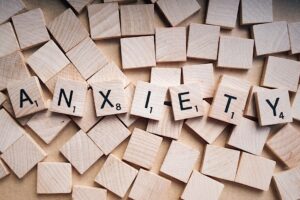Anxiety affects millions of people each year in the U.S. Learning how to cope with anxiety can spare you from the physical and emotional ailments caused by this mental condition. Don’t suffer alone. Help is available for anxiety and its symptoms that interfere with daily activities.
Physical and Mental Ailments Caused by Anxiety
Anxiety is part of the natural reaction to stress. When our minds perceive danger, the body releases cortisol and adrenaline into the bloodstream to enable us to run or fight. Unfortunately, for some people, chronic stress keeps their body and mind in a constant state of anxiety.
Chronic anxiety and stress can cause physical and mental ailments, such as:
- High blood pressure
- Rapid heart rate and palpitations
- Digestive issues
- Trouble concentrating
- Rapid weight gain or loss
- Appetite changes
- Sleep disturbances
- Heart disease
- Heart attack
- Stroke
- Headaches
- Worsening diabetes
- Menstrual and reproductive issues
- Depression
Chronic inflammation is also a concern and can increase the risk of heart disease, cancers, and inflammation in the brain. Learning how to cope with anxiety will lower the risk.
How to Cope with Anxiety
If you have dealt with anxiety for a while, you are familiar with the symptoms. You may experience nervousness, racing thoughts, excessive sweating, trembling, worry, feelings of dread and doom, insomnia, and fatigue. Focus and concentration are a challenge. Your anxiety symptoms start to interfere with your work, family life, responsibilities, and other relationships.
Learning how to cope with anxiety starts with small steps. You do not want to overwhelm yourself by trying different approaches all at once to manage symptoms. There are several lifestyle changes and habits you can incorporate into your day to manage anxiety symptoms, so choose one or two and practice those for a couple of weeks before trying a new one.
Pause and breathe
It takes practice to separate yourself during the height of emotions to take stock of how your body feels. We walk around in a state of stress and anxiety to the point that we are unsure what it would feel like without the tension. When you feel your stress rising, pause and take a deep breath. Exhale slowly as you lower your shoulders away from your ears.
Becoming more aware of your body will help you pinpoint tight spots. For example, try progressive muscle relaxation. Sit or lie down and close your eyes. Concentrate on your feet to start. Clench the muscles in your toes and hold for a few seconds.
Then, while exhaling, relax the muscles. Wait a moment and move on to the next muscle group. As you mentally scan your body, notice any areas still holding tension. Repeat in these areas if necessary. Eventually, you will know the difference between a fully relaxed muscle and one holding tension.
Catch negative thoughts
Anxiety can fill you with dread and excessive worry. A negative thought or belief typically triggers these emotions. However, not all thoughts are valid, just as not all beliefs are true. For example, a parent may have spoken harshly and critically to you during childhood.
If you’re feeling anxious on a regular basis, here are seven practical tips for how to cope with anxiety from a Christian perspective.Now, as an adult, you can still hear their voice criticizing you, or you entertain negative self-talk based on what they said. Their words about you may have been untrue, but you have accepted this view of the world as fact, and you perceive yourself through this lens. These lies create more anxiety.
Start today by catching negative thoughts and challenging false beliefs. Avoid all-or-nothing thinking. When you learn to reframe your thoughts, you can influence the emotions attached to them and change your behavior.
 Do something else
Do something else
Distraction may be a good thing when it comes to managing anxiety symptoms. Often, we focus on the racing thoughts and rapid heart rate to the point we become immobilized. Cortisol and adrenaline contribute to not only the fight or flight response but also the freeze response. We freeze in our fears, allowing the stress to take control.
Distractions focus your mind on the present and away from your worries and fears, often rooted in the past or future. When anxious thoughts hit, get moving. You can clean, work out, fold laundry, or mop the floors. Choose a healthy activity or hobby to lose yourself.
Go to bed earlier
Not enough sleep can contribute to anxiety. We try to fit in as much as possible throughout the day, often sacrificing sleep for late nights. Sleep is the body’s tool for recovery and repair. Quality sleep can decrease your risk of heart disease, lower stress, boost your mood and immune system, lower blood pressure, regulate blood sugar levels, and fight depression.
Go to bed an hour earlier to prioritize sleep. If an hour seems too much, try cutting it back by fifteen minutes every few nights. Avoid screens at least an hour or two before bed.
Go for a walk
A brisk walk triggers the body to release endorphins, which naturally lower anxiety, manage stress, and boost mood. Walking activates the parasympathetic nervous system. Chronic stress, however, activates the sympathetic nervous system, the fight-or-flight response. A person can burn out and become ill without the parasympathetic nervous system to balance the effects.
Aim for at least 7,500 to 10,000 steps daily at a moderate to brisk pace.
Identify your triggers
You can make lifestyle choices that will manage your anxiety symptoms, but to overcome anxiety, you need to identify your triggers. Depending on the triggers, you may be able to avoid, delete, delegate, or manage them to lower stress.
This might mean you need to distance yourself from toxic relationships, forgive, and move on. It might be taking a different route home from work or resigning from a position. You will not be able to avoid some triggers, such as a spouse’s behavior or financial strain. Consider counseling for managing triggers to keep your anxiety level low.
See if counseling is right for you
Counseling is more than talk therapy, although that method is highly effective. Anxiety counseling teaches people how to cope with anxiety by introducing psychotherapy methods like Cognitive Behavioral Therapy (CBT) and Exposure Therapy.
In Cognitive Behavioral Therapy, you identify your thoughts and emotions and work to reframe them to influence your behavior. You remove the power from negative thought patterns by replacing them with new thoughts and actions. Exposure Therapy is done in a safe space to help decrease anxious thoughts by exposing the client to their fears.
For example, someone with social anxiety may work with a counselor to visit the mall for fifteen minutes. Afterward, the counselor and client will discuss the visit and plan for another visit for a more extended period, perhaps thirty minutes the next time.
Finding an Anxiety Counselor Near You
If counseling sounds like a good fit for you, or you would like to know more about coping with anxiety, contact our office today. Our reception team would be happy to help you schedule a session with me or another Christian counselor in Washington to discuss your symptoms and perform an assessment before creating a care plan to manage anxiety. Contact us today to get started.
“Anxiety”, Courtesy of Wokandapix, Pixabay.com, CC0 License;



